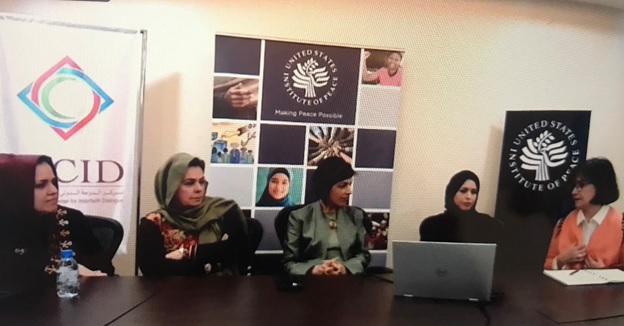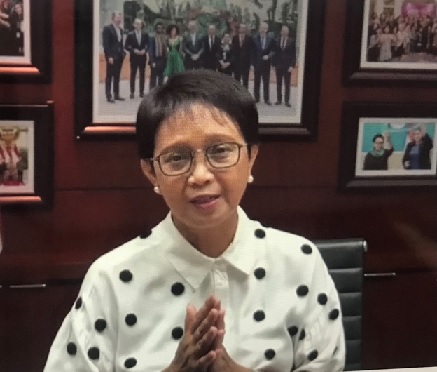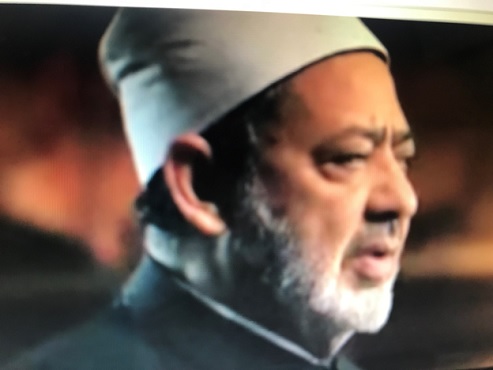Afghan Girls Deserve Education, USIP Panel Says
By Elaine Pasquini


Left to right: Kakar, Gailani, Amiri, Al Thani and Lyons

Retno Marsudi

Sheikh al Tayeb
Doha: In contrast to the rights women and girls enjoy in Muslim countries around the world, female students in Afghanistan are suffering since the Taliban rescinded their commitment to allow girls to attend high school.
On March 28, following on the heels of the Doha Forum where world leaders gathered to address a wide-range of geopolitical issues, the United States Institute of Peace hosted a webinar at the Doha International Center for Interfaith Dialogue titled “Islam, Peace and Women’s Rights in Afghanistan.”
In an encouraging show of unity, almost every panel at the forum touched upon the closing of girls’ schools in Afghanistan more than on the Ukraine conflict, Palwasha Kakar, interim director for religion and inclusive societies at USIP, reported. “It was amazing to see how much solidarity there was with Afghanistan. We know that real positive peace cannot happen without justice towards women and we know that women are key peace-builders in society.”
According to recent studies, when women are part of a peace process those efforts are 35 percent more likely to be successful, she explained. Additionally, “when women are a significant part of the workforce the country’s GDP increases 32 percent. Studies also show that in countries with a high participation of women in government and society these countries have lower levels of violent conflict.”
The Taliban’s reversal of their decision allowing high school girls their basic right to education “affects peace…growth…health, the prosperity of Afghanistan and is more likely to give rise to conflict,” Kakar said.
As US special envoy for Afghan women, girls and human rights, Rina Amiri, meets with Afghan women to learn what issues are paramount to them. One point important to the women was to make sure that their religion was not “weaponized” against them, Amiri related. “And that’s what the Taliban are doing.”
Amiri said it’s the responsibility of the Islamic world to stand up and say what the Taliban is doing “is not right, is not in our name, not in our faith,” noting that Islam is a religion that grants rights to women. “For those that use politics to strip women’s rights away and use religion to mask the politics is a crime on so many levels,” she added.
Amiri pointed out that the restrictions the Taliban have placed on women do not align with teachings in the Qur’an, and have nothing to do with “Afghan” culture. “It was not the way Islam was ever practiced in Afghanistan.”
The Taliban had previously agreed to girls’ education, calling it “an Islamic principle,” she continued. “The Taliban reneging on girls’ education could really be the turning point where the international community takes a very solid step back from engagement.”
Restoring some semblance of normality in Afghanistan is what is really needed, Amiri said, which requires bringing women in because that will make for “broader inclusivity and that is the lynchpin for peace in Afghanistan.”
Sheikha Alya Ahmed bin Saif Al Thani, Qatar’s permanent representative to the UN, called the Taliban’s decision to suspend opportunities for girls’ education “ un-Islamic,” adding it “has nothing to do with the teachings of Islam.”
Qatar, she noted, sets an example for education in the Islamic world. “Women enjoy their rights, especially for education, which is a basic one.”
The ambassador stressed that women in the Muslim world need to do more and organize to force the Taliban to reverse its decree preventing Afghan girls to attend public high schools.
Sheikh Ahmad Muhammad al Tayeb, Grand Sheikh of Al Azhar University and Grand Imam of the Al Azhar Mosque, one of the growing voices of Muslim scholars acknowledging the right of women to participate in society in equitable and meaningful ways, offered his thoughts in a taped message.
Pointing out that in Islam women are allowed to hold important government positions, the Sheikh said those who attempt to prevent women from this “constitutional legal and religious right” are committing “a major sin for which they will incur negative consequences on the Day of Judgment.”
Fatima Gailani, an Islamic scholar and member of the Afghan government’s negotiating team during the 2018 Afghan peace process and the talks with the Taliban in Doha in 2020, was outraged by the Taliban’s ruling to rescind girls’ educational opportunities.
“If it is right what they are doing, why is the Muslim world silent?” she asked, noting in other Muslim countries women have educational rights. “Women being in politics, women being learned, women being leaders is nothing new for Muslim women.”
Retno Marsudi, minister of foreign affairs for Indonesia, spoke virtually from Jakarta to show her country’s support for human rights in Afghanistan. “Indonesia is living proof that Islam and women empowerment can walk hand in hand,” she said.
“We firmly believe Afghan women can be powerful agents of change and will drive progress toward a new Afghanistan. Without their involvement there can be no lasting peace in Afghanistan.”
Deborah Lyons, the UN Secretary-General’s Special Representative to Afghanistan and head of the United Nations Assistance Mission in Afghanistan, expressed hope that the UN’s March 31 online funding pledge conference for Afghanistan, co-hosted by Germany, the United Kingdom and Qatar, will raise substantial desperately needed humanitarian funding.
While this funding is “unconditional,” she emphasized, “no one wants Afghanistan to remain as a humanitarian case year after year.” The donor countries need to direct the funds, so they enable the Afghans to support themselves.
“But, it’s going to be a tough conversation…how can you ask politicians anywhere in the world to provide funding from their taxpayers to support education when in fact not all of your population is getting access to education,” she posited.
The bottom line, Lyons stressed, is not to leave the Afghan people behind, “and we certainly do not leave young girls’ education behind.”
(Elaine Pasquini is a freelance journalist. Her reports appear in the Washington Report on Middle East Affairs and Nuze.Ink.)

